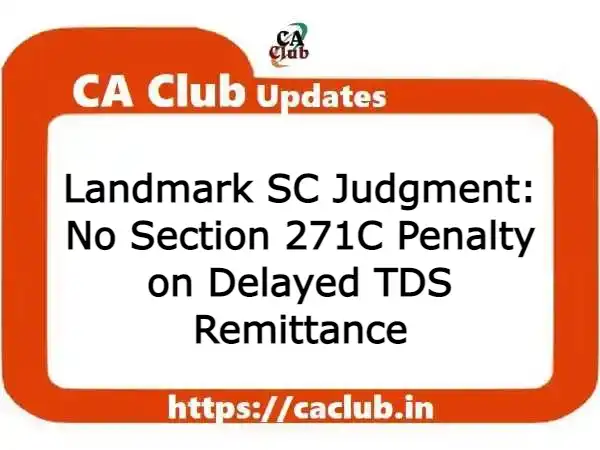In a landmark judgment that has significant implications for taxpayers and tax authorities in India, the Supreme Court has ruled that no penalty is leviable under Section 271C of the Income-tax Act, 1961, for the delay in depositing tax deducted at source (TDS). This article examines the key aspects of the US Technologies International Pvt. Ltd. vs CIT case, dated April 10, 2023, offering a comprehensive analysis of the judgment, the arguments presented by both parties, and the critical takeaways for taxpayers and tax professionals.
Background of the Case
The taxpayer, an Indian company, experienced delays ranging from five days to 10 months in depositing TDS pertaining to salaries and other contractual payments during April 2002 to February 2003. The Tax Officer (TO) levied penal interest under section 201(1A) and subsequently imposed a penalty under section 271C of the Income Tax Act. For the assessment years (AYs) 2010-11, 2011-12, and 2012-13, similar penalties were levied.
The taxpayer appealed to the Income-tax Appellate Tribunal (Tribunal), which ruled in their favor, stating that the penalty imposition under section 271C was unjustified. However, the Kerala High Court upheld the levy of penalty under Section 271C for the belated remittance of TDS, which the Supreme Court ultimately set aside.
Facts of the Case
i) The taxpayer deducted tax at source for salaries, contract payments, etc., between April 2002 and February 2003.
ii) A portion of the TDS was remitted belatedly, with delays ranging from five days to 10 months.
iii) Following a survey, the Tax Officer (TO) levied penal interest under Section 201(1A) and subsequently imposed a penalty under Section 271C.
Similar issues arose for Assessment Years (AY) 2010–11, 2011–12, and 2012–13, with penalties being imposed under Section 271C. The Income-tax Appellate Tribunal (Tribunal) ruled in favor of the taxpayer, noting reasonable causes for belated remittance of TDS. However, the High Court allowed the Revenue’s appeals, relying on its own judgment.
Taxpayer’s Contentions
The taxpayer argued that:
i) The case involved late remittance, not non-deduction of TDS, and while penal interest under Section 201(1A) was applicable, penalty under Section 271C was not.
ii) Penal provisions must be construed strictly and literally, without adding anything more to the text.
iii) Section 276B, dealing with failure to pay, uses different wording than Section 271C, indicating different consequences for non-payment of TDS.
iv) The full bench of the Kerala High Court had overruled the impugned judgment in a separate case.
v) For AYs 2010–11, 2011–12, and 2012–13, Section 273B should prevent penalty imposition if the taxpayer proves a reasonable cause for failure.
Revenue’s Contentions
The Revenue argued that:
i) Section 271C was inserted to provide for the levy of penalty for failure to deduct tax at source, even if tax was deducted but not remitted or remitted belatedly.
ii) CBDT Circular No. 551 dated January 23, 1990 explained the rationale for inserting Section 271C, emphasizing that in addition to prosecution, a person who deducts TDS but doesn’t remit it is also liable to pay penalty.
Supreme Court Decision
The Supreme Court observed that the case involved belated remittance of TDS and not non-deduction of TDS. They agreed with the taxpayer’s contention that section 271C(1)(a) of the Income Tax Act was not applicable in this case, and the words “fails to deduct” could not be read to mean “failure to deposit or pay the tax deducted.” The Court held that there would be no penalty leviable under section 271C for a mere delay in the remittance of TDS after the taxpayer has deducted it. The consequences of non-payment or belated remittance of the TDS would be covered under sections 201(1A) and 276B of the Act.
Key Takeaways
The Supreme Court’s ruling emphasizes the literal and strict interpretation of penal provisions, asserting that mere belated remittance of TDS, after the taxpayer has deducted it, would not attract penalty under section 271C of the Act. This judgment provides clarity and relief to taxpayers who have faced penalties for delayed TDS deposits despite having deducted the tax at source.
The Supreme Court also underscored that if there is any omission to deduct tax at source, it could lead to a loss of revenue. In such cases, there are remedial measures such as penal interest under section 201(1A) of the Income Tax Act and prosecution proceedings under section 276B of the Act.
Taxpayers and tax professionals should take note of this judgment and its implications, as it offers clear guidance on the interpretation of penal provisions in the Income-tax Act, 1961. Furthermore, it is essential for taxpayers to ensure that they diligently adhere to tax deduction and deposit timelines to avoid the risk of penalties and prosecution.
Conclusion
The Supreme Court’s ruling in the US Technologies International Pvt. Ltd. vs CIT case offers valuable insights and guidance to taxpayers and tax professionals in India. By adopting a strict interpretation of penal provisions and clarifying the levy of penalties for delayed TDS deposits, the judgment emphasizes the importance of adhering to tax deduction and deposit timelines. Taxpayers must remain vigilant in their tax compliance to avoid the risk of penalties and prosecution, while tax professionals should take note of this judgment and its implications as they navigate the complex landscape of the Income-tax Act, 1961.
